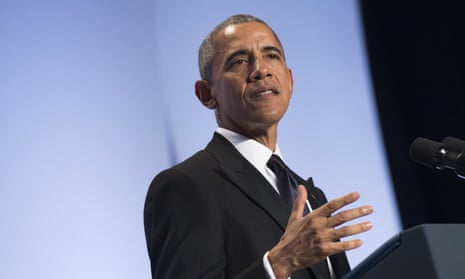Barack Obama is launching a crackdown on international tax evasion in response to recent disclosures in the Panama Papers revealing the scale of offshore financial activity.
In a series of initiatives announced by the White House on Thursday night, the president will take executive action to close loopholes used by foreigners in the US and call on Congress to pass legislation.
Though the later steps may hit political obstacles in an election year, the package of measures are among the most comprehensive responses yet to the Panama Papers revelations, disclosed by a consortium of international journalists including the Guardian.
“In recent weeks, the disclosure of the so-called ‘Panama Papers’ – millions of leaked documents reportedly revealing the use of anonymous offshore shell companies – has brought the issues of illicit financial activity and tax evasion into the spotlight,” said the White House in a statement.
“The Panama Papers underscore the importance of the efforts the United States has taken domestically, and the efforts we have undertaken with our international partners, to address these shared challenges.”
Earlier Obama, who is also under pressure to limit the flow of corporate money out of the US, was one of the first world leaders to respond to the record-breaking leak last month.
“There is no doubt that the problem of global tax avoidance generally is a huge problem,” Obama told reporters in an unscheduled appearance last month. “The problem is that a lot of this stuff is legal, not illegal.”
The initial package of measures outlined by the White House this week may not go as far as some campaigners wish, but focus largely on increasing transparency regulations as a tool to flush further offshore tax abuses into the open. These include:
- immediate executive action to combat money laundering, terrorist financing, and tax evasion with tighter transparency rules
- new Treasury rules closing a loophole allowing foreigners to hide financial activity behind anonymous entities in the US.
- stricter “customer due diligence” rules for banks handling money on behalf of clients
The White House and Treasury also called on Congress to pass a series of detailed measures they say would more directly tackle the problem of offshore tax avoidance in the longer run.
“The Treasury Department has long focused on countering money laundering and corruption, cracking down on tax evasion, and hindering those looking to circumvent our sanctions,” the treasury secretary, Jack Lew, said in a statement.
“Building on years of important work with stakeholders, the actions we are finalizing today mark a significant step forward to increase transparency and to prevent abusive conduct within the financial system.”
The new rules were, however, met with skepticism by watchdog groups. The Treasury plans to require financial firms to collect ownership information of anyone with 25% equity interest in a company.
That proposal - first floated in 2014 - has been called too broad and easy to circumvent by the International Monetary Fund among others.
“Under the new rule, the threshold for reporting ownership information is 25%, and entities reporting beneficial ownership information to banks can list a senior manager - not an owner - as the primary name on the disclosure form,” tax watchdog Global Witness pointed out in its statement.
“This means that it is possible to comply with the regulation without actually naming a beneficial owner. While ultimately it may be that the rule creates some forward momentum, the weaknesses in this rule represent a missed opportunity by the administration to get the details right the first time.”
